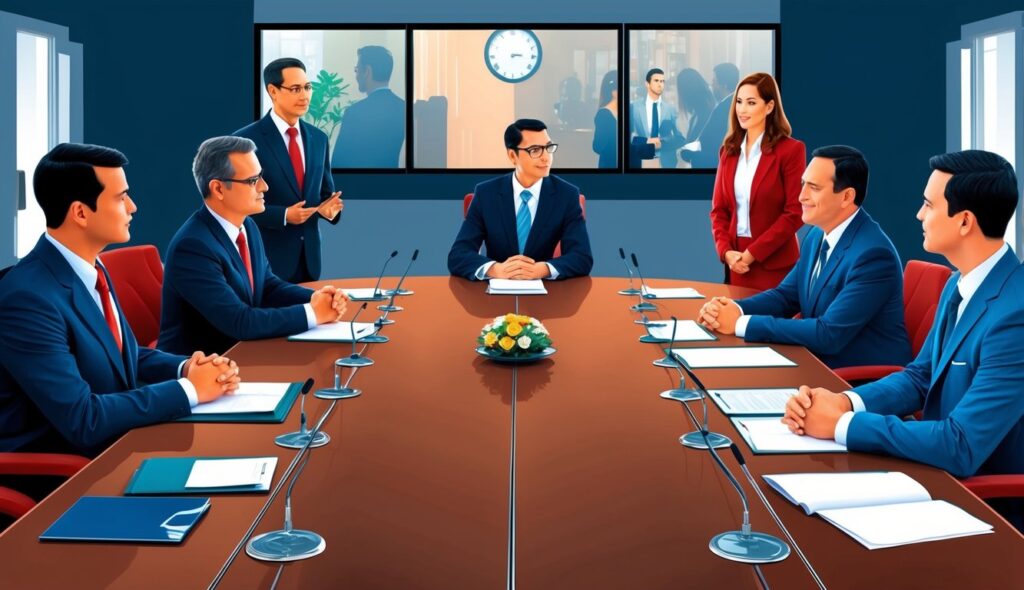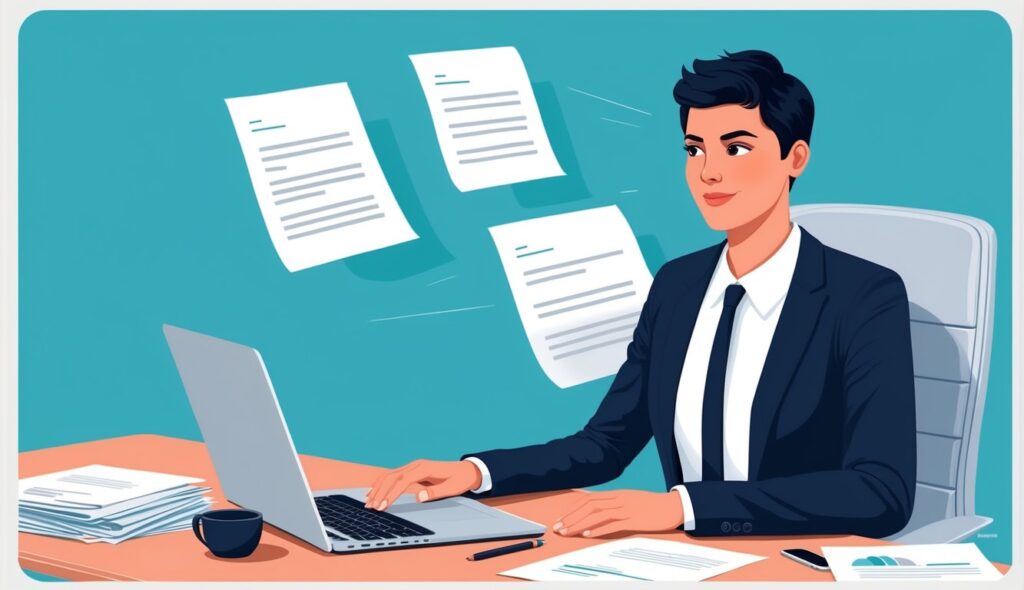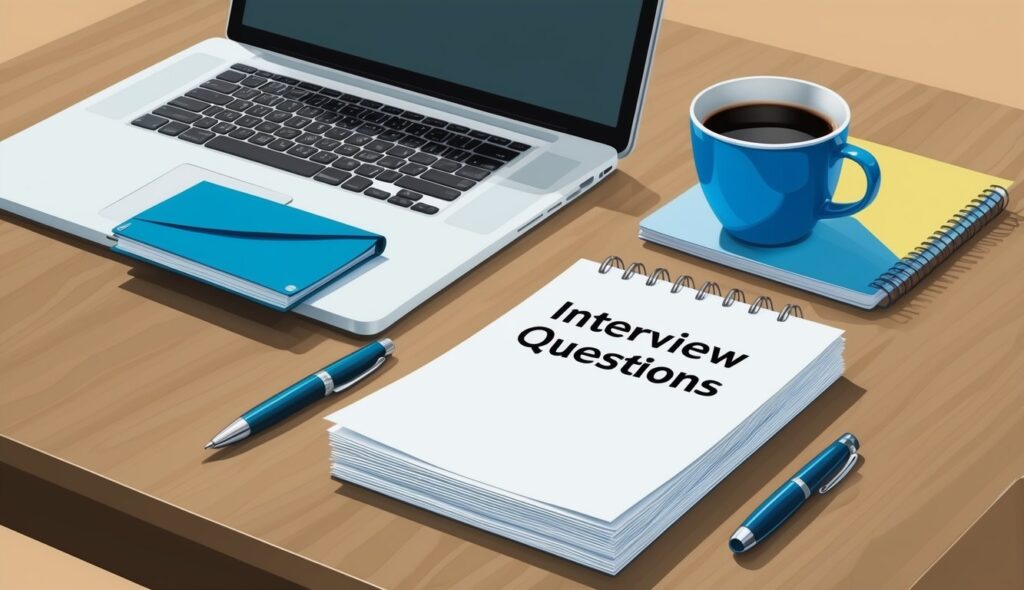90+ Deloitte Interview Questions and Answers: Ace Your Next Job Interview

Preparing for a Deloitte interview can be intimidating, but with the right approach, it’s totally manageable. As a leading global professional services firm, Deloitte values candidates who exhibit critical thinking and flexibility.
Understanding the types of questions you might face can dramatically increase your chances of success.

You can expect a range of questions, from technical ones specific to your role, to behavioral and situational questions that assess how you handle workplace scenarios. This post covers more than 90+ Questions for Job Interview at Deloitte.
Deloitte often focuses on your past experiences and how they can be applied to their work environment. Knowing what to anticipate can make you feel more confident during your interview.
It’s essential to practice answering these questions to ensure your responses are concise and relevant.
This preparation not only helps you feel ready but also shows Deloitte you’re a great match for their team.
Understanding the Deloitte’s Interview Structure

The Deloitte interview process usually includes behavioral and technical interviews. Each has a specific focus, aiming to assess different skills and qualities.
Behavioral Interview
Behavioral interviews at Deloitte focus on understanding how your past experiences align with the company’s values and job requirements. These questions aim to gauge:
- Teamwork: Your ability to work collaboratively in a team setting.
- Leadership: How you take initiative, inspire others, or resolve conflicts.
- Problem-Solving: Your analytical skills and ability to address complex challenges.
- Adaptability: Your response to change and handling unexpected situations.
- Client-Centricity: How you deliver value to clients or stakeholders.
“Share an experience where you solved a complex problem with limited information.”
- This question evaluates your ability to think critically, navigate ambiguity, and find the right solutions even when you don’t have all the details at hand.
“Tell me about a time you worked on a team project and faced challenges.”
- Deloitte is keen to know how well you collaborate with others, handle conflicts, and contribute to achieve team goals when obstacles arise.
“Describe a situation where you had to take the lead.”
- This assesses your leadership skills, initiative, and ability to step up and guide a team or project when it is needed.
“Tell me about a time you had to adapt to a significant change at work or school.”
- Here, Deloitte wants to gauge your adaptability and resilience, as change is inevitable in fast-paced corporate environment. So, you will should be well prepared before the interview.
“Give an example of a time you had to manage competing priorities or deadlines.”
- This question explores your time management skills and your ability to stay organized and focused when juggling multiple tasks in hand. Appearing for the interview is like a roller coaster ride.
This post will provide a good insights regarding good interview Questions for vacancy at Deloitte.
“Describe a situation in which you had to communicate a difficult message to a colleague or client.”
- Effective communication is essential, and this question aims to understand how you approach sensitive or challenging conversations with professionalism and clarity.
“Tell me about a time you used data or analytics to make a decision or solve a problem.”
- Deloitte places a strong emphasis on data-driven decision-making, and they want to know how you use insights to inform your choices.
“Give an example of how you handled a disagreement or conflict within a team.”
- Conflict resolution is an important skill in any workplace. This question assesses how you approach resolving differences in a constructive manner.
“Tell me about a time when you had to learn something new quickly in order to complete a task.”
- Deloitte values continuous learning and development. This question highlights your ability to pick up new skills or knowledge rapidly when the situation demands it.
“Describe a time you went above and beyond to achieve a goal or deliver a project.”
This explores your work ethic and commitment to excellence, as well as your willingness to go the extra mile to achieve success.
Technical Interview Overview
The technical interview focuses on your professional knowledge. You might be asked about your technical skills and how you apply them. Be ready to discuss tools and technologies related to your field.
Review job-specific skills before your interview. This could include discussing past projects and how you solved technical challenges. Prepare to solve problems on the spot, as they may test your practical abilities.
Deloitte Interview Questions

When preparing for a Deloitte interview, focus on three main areas: how to tackle situational and problem-solving questions, understand technical questions related to the job, and address problem-based scenarios effectively.
Situational and Problem-Solving Questions
Situational questions often test your ability to handle challenges. Employers use these to see how you think on your feet and resolve issues.
For instance, a common Deloitte question might be: “Describe a time you worked under pressure.” Practice your responses to these types of questions using this method.
Technical Questions Pertaining to the Role
Technical questions focus on the specific skills and knowledge required for the job. At Deloitte, these might relate to accounting, auditing, or consulting, depending on the position. Refresh your understanding of the core concepts and current industry trends.
Prepare to discuss your past work experience and how it applies to the role. You might be asked to explain a complex concept, so practice simplifying technical jargon into clear, understandable terms.
Additionally, it can be helpful to review any software or tools popular in your field, as questions may test your familiarity with these resources.
Problem Based Questions
Problem-based questions assess your critical thinking and decision-making skills. You might be asked to solve a hypothetical problem or improve a process at Deloitte. These questions often come without a right or wrong answer, focusing more on your thought process.
Here’s a simple technique:
- Identify the main problem.
- Analyze the factors contributing to it.
- Propose several potential solutions.
- Evaluate which solution might lead to the best outcome.
Being able to articulate your reasoning with confidence is the key. Practicing these steps can help you approach such questions strategically and demonstrate logical thinking during the interview.
Evaluating Professionalism and Communication Skills

During an interview, your professionalism is on display. This includes how you present yourself and how you interact with others. Dress appropriately and arrive on time. Show respect in your language and demeanor.
Communication skills are key in evaluating candidates. Speak clearly and listen actively. Keep your answers relevant and on topic. Avoid interrupting and ensure you answer the question asked.
You may be asked about your career goals. Share your ambitions in a way that aligns with the company’s values. Be honest about where you see yourself in the future.
Discussing salary expectations requires tact. Research typical salaries for the position. Mention a range instead of a fixed number. This shows you are open to discussion.
Negotiation skills might come up during this topic. Be prepared to discuss how you’ve negotiated in the past. Highlight your ability to find solutions that benefit all parties involved.
Practicing these aspects can greatly impact the impression you make. Stay calm and grounded, focusing on demonstrating both your professionalism and ability to communicate effectively.
List of 90 Deloitte Interview Questions

1. How do you apply the time management method in your problem-solving approach?
2. Describe a challenging group discussion you were part of and your role in it.
3. How would you handle spontaneous responses in a high-pressure situation?
4. Explain the difference between internal and external audit processes.
5. What techniques do you use for accurate revenue recognition?
6. How do you prioritize tasks when faced with multiple deadlines?
7. Describe a time when you disagreed with a team member during a project.
8. What strategies would you employ to lead a group discussion round effectively?
9. How would you assess the effectiveness of an audit report?
10. Discuss a situation where you had to adapt quickly to unexpected changes.
11. What are the key challenges of auditing for a multinational firm like Deloitte?
12. Explain your approach to managing client expectations during an audit.
13. How do you ensure compliance with audit standards and regulations?
14. Describe your experience with ERP systems in auditing.
15. How do you handle ethical dilemmas in the workplace?
16. Discuss a successful collaboration with a diverse team.
17. What methods do you use to verify financial statements’ accuracy?
18. How do you manage stress during tight audit cycles?
19. Describe a project where you had to deliver under strict time constraints.
20. What do you consider the most important skill for an auditor at Deloitte?
21. How do you stay updated with changes in audit regulations?
22. Explain the importance of confidentiality in auditing.
23. How would you improve communication in a team setting?
24. Discuss your experience with risk management audits.
25. Describe a situation where you had to present complex information clearly.
26. How do you prioritize tasks in a dynamic work environment?
27. What is your approach to continuous professional development?
28. Describe how you handle conflicts in a team.
29. How do you evaluate financial health during an audit?
30. What techniques do you use to ensure accuracy in your work?
31. Why do you want to work at Deloitte?
32. How do you align your goals with those of the organization?
33. Describe a time you had to learn a new software quickly.
34. How do you address underperformance in a team project?
35. What strategies do you use for effective time management?
36. Discuss a time you had to change your communication style.
37. Explain the role of data analytics in auditing.
38. How do you ensure integrity in your work?
39. Describe a project where you exceeded expectations.
40. How do you balance quality and efficiency in audit tasks?
41. What do you see as the future challenges in auditing?
42. How do you foster innovation in your work processes?
43. Describe a time you had to defend your recommendations.
44. How do you build trust with clients?
45. What role does feedback play in your professional development?
46. Explain how you handle high-pressure situations.
47. How do you ensure collaboration across departments?
48. Discuss a time when you had to handle multiple priorities.
49. What is your strategy for continuous improvement?
50. How do you maintain motivation during long projects?
51. Describe a time when you solved a complex business problem.
52. How do you use technology to improve audit efficiency?
53. What steps do you take to manage audit risks?
54. How do you handle ambiguity in financial data?
55. Describe a time you provided critical feedback to a colleague.
56. How do you support team members to achieve their full potential?
57. Discuss the importance of diversity in the workplace.
58. How do you approach decision-making under uncertainty?
59. Describe your familiarity with International Financial Reporting Standards.
60. How do you ensure alignment with organizational goals?
61. What are your strategies for conflict resolution?
62. Describe your role in enhancing audit effectiveness.
63. How do you adapt to new audit methodologies?
64. Explain the importance of strategic thinking in auditing.
65. How do you incorporate ethical considerations in your work?
66. Describe a time when you had to make a difficult decision quickly.
67. How do you evaluate the scalability of an audit process?
68. What approach do you take to learn from mistakes?
69. Describe your experience with compliance audits.
70. How do you measure the success of an audit engagement?
71. What role does leadership play in audit projects?
72. How do you maintain a high level of accuracy in your work?
73. Describe your strategy for handling large datasets.
74. How do you address gaps in team knowledge or skills?
75. Discuss a time you inspired others to achieve a common goal.
76. How do you prioritize relationships with stakeholders?
77. Describe a time you implemented a new auditing tool or technology.
78. How do you ensure effective communication in remote teams?
79. What initiatives have you taken to enhance audit efficiency?
80. Discuss your approach to sustainable business practices in auditing.
81. How do you maintain a balance between client demands and audit requirements?
82. Describe a project that required you to innovate.
83. What do you consider when evaluating audit evidence?
84. How do you approach talent development within your team?
85. Describe a situation where you had to manage financial discrepancies.
86. How do you handle feedback from clients or supervisors?
87. What techniques do you use to facilitate effective team discussions?
88. How do you align your performance with Deloitte’s values?
89. Describe a time you streamlined a process to improve efficiency.
90. How do you create a positive work environment?
91. What strategies do you use for mentoring junior team members?
92. How do you overcome challenges in cross-functional projects?
93. Describe your role in ensuring project deliverables meet quality standards.
94. How do you prepare for significant organizational changes?
95. Discuss the role of technology in risk management.
96. How do you address shortcomings in financial reports?
97. Describe your involvement in leadership roles outside of work.
98. How do you prioritize ethical standards in your decision-making process?
99. What steps do you take to ensure the accuracy of data analysis?
100. How do you contribute to a culture of continuous learning and development?
Top 10 Deloitte Interview Questions with Sample Answers
1. Describe a time when you had to analyze a complex problem. What approach did you take and what was the outcome?
Sample Answer: “In my last project at university, we were tasked with analyzing a company’s declining market share. I began by gathering data from multiple sources, including financial reports, customer surveys, and competitor analysis.”
I used a SWOT analysis to identify internal weaknesses and external threats. By presenting my findings, I was able to recommend a targeted marketing strategy that focused on customer retention. The company implemented my suggestions, resulting in a 25% increase in market share over the following quarter.
2. How do you stay current with industry trends and changes?
Sample Answer: “I stay current with industry trends by subscribing to key publications such as Harvard Business Review and Financial Times. I also participate in relevant webinars and attend industry conferences when possible.”
Additionally, I engage with professional networks on platforms like LinkedIn, where I follow thought leaders and industry experts. This continuous learning allows me to bring fresh insights and relevant knowledge to my work.
3. Can you provide an example of a time when you had to persuade someone to see things your way?
Sample Answer: “During a group project, I proposed a new analytical framework that I believed would enhance our research. Some team members were hesitant to shift from our original plan. I organized a meeting where I presented data supporting my approach and demonstrated its potential benefits through a pilot analysis.”
After addressing their concerns and showing how my framework could lead to more comprehensive results, the team agreed to implement it. Ultimately, our project received top marks for its innovative approach.
4. What would you do if you were assigned a project with a tight deadline and limited resources?
Sample Answer: “I would start by assessing the project scope and identifying the most critical tasks that need to be completed. I would prioritize these tasks and allocate resources accordingly. If necessary, I would communicate with my supervisor to discuss the possibility of reallocating resources or extending the deadline.”
I believe in leveraging collaboration, so I would also reach out to team members to delegate tasks based on their strengths. This approach would help ensure we meet the deadline while maintaining quality.
5. Describe a situation where you had to deal with ambiguity. How did you approach it?
Sample Answer: “In a previous internship, I was assigned to a project with unclear objectives and no defined methodology. To tackle this ambiguity, I first gathered as much information as possible from stakeholders. I then facilitated a brainstorming session with my team to clarify our goals and outline potential strategies.”
By creating a structured plan with milestones, we were able to navigate the ambiguity and deliver a comprehensive analysis that met the stakeholders’ needs.

6. How do you handle a situation where you and a colleague disagree on a critical issue?
Sample Answer: “When disagreements arise, I believe it’s essential to approach the situation with an open mind. I would first seek to understand my colleague’s perspective by asking questions and actively listening. Then, I would present my viewpoint with supporting evidence.”
If we still cannot reach a consensus, I would suggest involving a neutral third party, such as a supervisor, to facilitate the discussion. Ultimately, my goal is to find a solution that benefits the team and the project.
7. What is your understanding of Deloitte’s culture, and how do you see yourself fitting into it?
Sample Answer: I understand that Deloitte values collaboration, integrity, and innovation. The emphasis on teamwork and diverse perspectives resonates with me, as I believe that the best solutions come from collective input.
I am adaptable and thrive in collaborative environments, which would allow me to contribute positively to the team dynamic.
Additionally, I am committed to continuous learning and professional development, aligning with Deloitte’s focus on growth and excellence.
8. How would you approach a client who is resistant to change?
Sample Answer: “I would first seek to understand the client’s concerns by asking open-ended questions and actively listening to their feedback. It’s important to empathize with their situation and validate their feelings. I would then present data and case studies that illustrate the benefits of the proposed changes, focusing on how they align with the client’s goals.”
By building trust and demonstrating the value of the change, I would work to create a collaborative environment where the client feels supported throughout the transition.
9. What strategies would you use to manage multiple projects with competing deadlines?
Sample Answer: I would employ effective time management techniques, starting with a comprehensive project timeline that outlines all deadlines. I would break each project into smaller tasks, assigning priorities based on urgency and importance.
Regular check-ins with team members would help ensure that everyone is aligned and on track. I would also remain flexible and be prepared to adjust my plans as needed, communicating proactively with stakeholders about any potential delays or challenges.
10. Can you discuss a time when you had to learn something new quickly to complete a task?
Sample Answer: During my internship, I was assigned to a project that required knowledge of a new data analysis software that I had never used before. I quickly enrolled in an online course and dedicated extra hours to practice. I also reached out to colleagues who were proficient with the software for guidance.
Within a week, I was able to apply my new skills to the project, and my analysis contributed significantly to our final report. This experience taught me the importance of adaptability and leveraging available resources for rapid learning.
Frequently Asked Questions for Job Interview at Deloitte

In a Deloitte’s interview, you can expect a range of questions that test your skills and fit for the company. Different types of interviews focus on behavioral, technical, and HR aspects. Preparation and strategy play key roles in tackling each stage successfully.
How can a candidate prepare for a behavioral interview at Deloitte?
Prepare by reviewing common behavioral questions and thinking of examples that showcase your skills. Practice speaking clearly and confidently about your experiences with teamwork, leadership, and problem-solving.
Which technical questions are likely to be asked for a position in Deloitte’s team?
Technical questions depend on the position. For IT roles, they might ask about programming languages like Java or Python. You could also face questions about data analysis, cybersecurity, or system design. Review the job description to focus on relevant topics.
What strategies should candidates employ to successfully pass a Deloitte internship interview?
Research Deloitte’s values and recent projects to understand the company better. Practice answering both behavioral and technical questions. Highlight your willingness to learn and adapt. Show enthusiasm about joining the team and contributing to their projects.

What are some specific questions asked during a Deloitte HR interview?
In an HR interview, you might be asked about your career goals and how you handle stress. Questions about teamwork and conflict resolution could also come up. Be ready to discuss your previous job experiences and how they relate to the position you’re applying for.
Can you give examples of questions posed to freshers in Deloitte interviews?
For freshers, questions often focus on academic projects and internships. You might be asked to explain your role in a team project or a challenging problem you solved. Demonstrate your eagerness to learn and how you can apply your skills to a real-world setting.
What are the key areas of focus in Deloitte’s interview process for experienced candidates?
Experienced candidates should be prepared for questions about management skills and industry-specific knowledge. Expect to discuss past work achievements and how you’ve led teams or projects. Be ready to solve case studies or scenarios relevant to your field.
All the Best!






